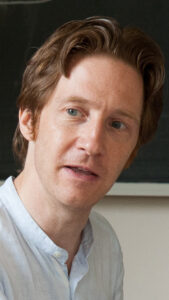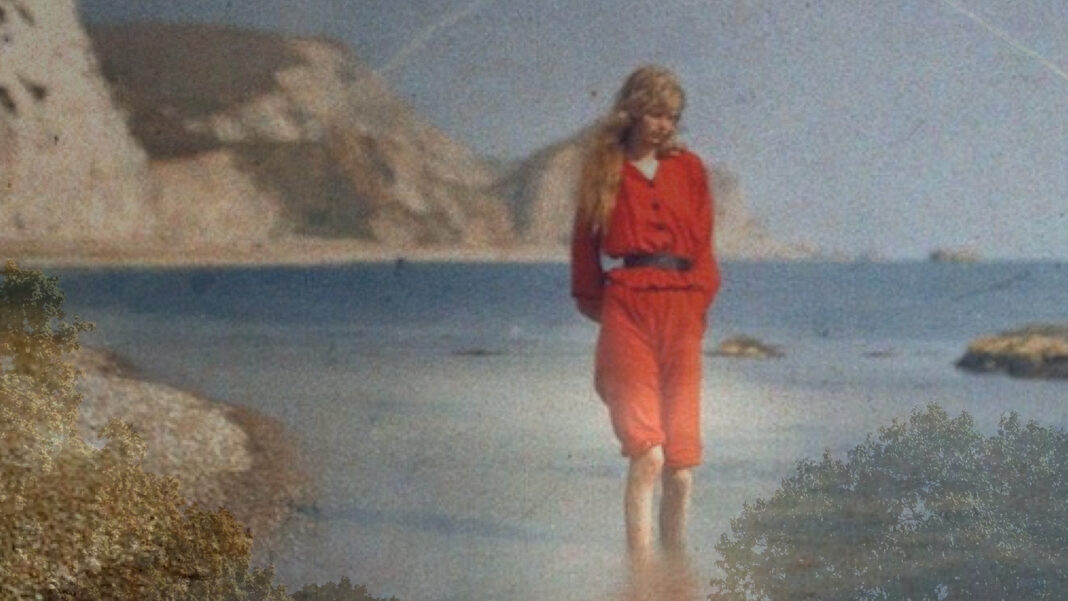Do you know the expression “Life is short, opera is long?” Many of Wagner’s operas run close to and over four hours in length. Einstein on the Beach by Philip Glass runs four hours and is performed without an intermission. Are you ready for an even longer opera? Six hours in length? If so, allow me to introduce you to Stranger Love.
Composer Dylan Mattingly and librettist Thomas Bartscherer didn’t set out to create an opera that runs nearly six hours. That just is what happened. It’s a project they’ve been working on for 11 years. In 2018, as part of the Prototype Festival in New York, there were two concert performances of the first act. When the Los Angeles Philharmonic presents Stranger Love on Saturday it will be the world premiere production of the entire work. There is just one performance.
Lileana Blain-Cruz directs. David Bloom conducts the ensemble Contemporaneous. Mattingly and Bloom are Co-Artistic Directors of Contemporaneous.
Earlier this week I spoke with Mattingly and Bartscherer about Stranger Love, the experience they’ve had creating it and the inspiration they found in John Coltrane. What follows are excerpts from our conversation that have been edited for length and clarity. To see the full interview, please go to our YouTube channel.
Q: You reference Octavio Paz in Scene 12C: Lullaby. Paz wrote, in An Alternating Current in 1967, “Art is an invention of aesthetics, which is which in turn is an invention of philosophers. What we call art is a game.” Do you agree with him and what is your view of art as evidenced by the work each of you do in general and have done specifically with Stranger Love?

Bartscherer: Without the context, it’s difficult to jump in immediately. What first comes to mind is that there is something really interesting about thinking about games. There are two kinds of games: games that are solved, like tic tac toe, where once the first move is made, if you know the game, you know what all the alternatives are. Then there are unsolved games like chess. I know how to play the game, but I don’t know what all the options are.
I do like to think that work like this is an open and unsolved game. There’s something that’s necessarily undetermined at the beginning – both in terms of the making of it and the experiencing of it. What Paz might be getting at there is if you have a certain conception of art that emerges from a philosophical or a theoretical perspective, it might be more like a closed game. Whereas for him, if I’m reading that correctly, it doesn’t have that closed nature. It isn’t a theoretical construct, but is rather an opening or a way of being open to possibilities. And it’s certainly felt in creating this work that there was an openness to what would come.
Mattingly: I’ll tell you, I have no idea what art is. It’s a total mystery to me. There are a lot of things that I feel like I have some handle on of what they are and what they do in the world. I cannot tell you with any certainty what I think art is or does. In some way that’s probably why I’m so drawn to it. But I think that the impossibility of it, the indescribable nature of of art, or at least of my favorite art, is the thing that pulls me. Part of my response to that quote is that it’s hard for me to imagine art as the object, as the thing that gets created or gets described.
The world is a place where, among other things, we get to experience art. Finding ways to to be able to have that joy, which is sometimes a game, is kind of the greatest thing that exists on this planet.
Q: In the first sentence of your artist statement on the Stranger Love website, you say “Stranger Love is not practical.” It strikes me that art isn’t in and of itself practical and really shouldn’t be practical. But is there a practicality that is required to create art?
Mattingly: The pursuit of art is not a practical pursuit. As an artist, I’ve chosen to spend my life doing this one very impractical thing. If I was trying to do something practical, I would choose to do just about anything else in the world. Going into it with that mindset, it doesn’t feel right to be thinking about the practicality of the thing I’m creating at the beginning. Because the whole point is that I’m doing something that’s after beauty and joy. The experience of the world in ways that live outside of that day-to-day experience: the things that are practical, things that are often necessities of the world. Devoting my life to trying to create something that’s outside of that.
Q: I would assume this is the kind of project for both of you that many people would ask why would you do something like this? It’s never going to get performed. How do you move forward when a lot of the world is telling you what not to do, when this is what you want to do?
Mattingly: It’s really, really, really, really hard is the answer to that question. I feel like this life that I’ve chosen is the the best thing that I could possibly do, but I’m not sure that I would recommend it to anybody else. It’s extremely difficult to want something to exist in the world that doesn’t or to want the world to exist in a way that it doesn’t quite. To try and change everything into the shape that would make that happen, it’s so difficult. It really shows me how small I am as a human being against the forces of the world and the universe in a way that I felt that in an ecstatic way. When I look at the stars, I feel gloriously happy to be so tiny in the universe. But it’s also something that’s very terrifying in another way to see how strong the rest of the world is if you want it to be different at all.
Bartscherer: I think to a large extent, at least in my experience, it’s beyond my decision or control in certain ways. The beauty and the goodness of the thing you’re making draws you on and inspires you. The joy and the thrill of seeing it come into being is so sustaining even with the onslaught of doubt or criticism or being told that’s impossible. But it’s so beautiful. It has to be. Where that comes from is a mystery to me.
Q: What was the original impetus for this project? Was it always something you both envisioned as having a serious length as it does?
Bartscherer: This is the sort of thing one has been preparing for all one’s life. Of course, everything that you do in a way, you’ve been preparing for it all your life. But with this I felt that so much of things that Dylan and I’d been thinking about for a very long time really came together in this. We first started talking about it in April of 2012.
I remember coming out of a concert that Dylan had performed in with a musical idea that might make sense with some voices. It had a specific structure and I shared that idea with Dylan.
Mattingly: I feel like going back further for me makes sense. I was six years old when I knew that I wanted to be a composer and very quickly was introduced to the magic of creating something out of nothing in that way. It was the most wonderful thing in the world. I have spent most of my life with that certainty of knowing this is the life that I want. I had spent my whole life on that path and I had done all the things that it seems to make sense to do to become a composer. [It was] around that time in 2012 when I realized that the things I really, really wanted to create were not really accessible on that path.

I realized that what I wanted to create were worlds that people could live in for as long as possible. It wasn’t necessarily a realization that I wanted to write long music, but it was the realization that I wanted to write things that would change your life from the moment when you stepped into it to the moment you left. Because those were my favorite things. It really required taking a huge leap into the unknown in order to carve out a different life for myself.
So when Thomas had this idea, it was right around the same point in my life where I was realizing that I felt like I had the capacity to do it. I could make the things that I felt were my favorite things in the world, but it would necessitate me giving everything to doing it. It took a couple of years from that moment to really make that decision and saying this is what I’m going to do.
Q: Did the work tell you that it needed to be 6 hours?
Mattingly: That’s exactly right. We did not go into this saying let’s write a six hour piece. I think the initial vision that Thomas had was thinking maybe an hour.
Bartscherer: There are these great messages between us where one of us says, “Wait a sec, you know, this is getting very long.” And the other one says, “That’s okay. Let’s just do what we need to do and worry about it later.”
Mattingly: We kept coming back and asking ourselves it’s going to be over 3 hours now. I don’t think it makes sense to write this totally wild thing that can never exist. We just kept following it wherever it seemed like it was supposed to go and it ended up at the length that it is.
Q: I feel like there’s a lot of work that’s being done at this time in our lives that is asking us to cut out the noise and the distractions. Why is that important to both of you because I assume that is an ultimate goal for what this work accomplishes?
Bartscherer: I think that one of the reasons why it’s so important and so valuable is because there’s a way of stepping out of our normal experience of time which increasingly is fragmented. Slowing down. One way to talk about it is for the imagination to dilate, to expand. That’s not just the creative or the artistic imagination. It’s also the ethical imagination, the political imagination to be able to think about things that move at a different time scale. A kind of thinking that is not instantaneous, that requires that you dwell for a while, that you move slowly.
Mattingly: So much of this music is also wanting to give us access to the things that we love so much about being alive. To just live in a world that’s made up of those things to remind us of what’s beautiful about being in this world. In order to do that, I think it is necessary to be able to to push out the noise to some degree and to live in a slower time.
Q: Your director, Lilliana Blain-Cruz, was quoted in the New York Times interview with Zachary Wolfe as saying, “I also think the dedication to joy is an interesting politics.” I’ve long thought the creation of art is a political act, but have we gotten to the point where joy itself is a political act?
Mattingly: I think the answer is yes. I don’t know about joy itself. Hopefully that’s something that we still always have. But certainly creating something that is so committed to joy, I do think it is.
Bartscherer: The piece really does reject cynicism completely, but it doesn’t reject pain or suffering or difficulty. For me, it’s also related to the question of imagination. If there’s not a moment that you can affirm and say, yes, this is worth it, how can you imagine a world different and better than the one you’re in?
Mattingly: Life is very difficult in a lot of ways. It is easy to be cynical and it’s hard at times to love the world. It does feel like a very important political experience to find ways in spite of, and in its totality and because of all the things within it, to love the world. I think this piece is really committed to that.
Q: I’m also assuming that it’s no accident that there is a reference to John Coltrane and A Love Supreme on the first page of the opera’s website. I think that what you’re trying to do is a lot of what Coltrane was trying to do. This is how Coltrane described it for himself in the year 1957. “I experienced, by by the grace of God, a spiritual awakening which was to lead me to a richer, fuller, more productive life. At that time, in gratitude, I humbly asked to be given the means and privilege to make others happy through music.” Are you guys on that same journey?
Mattingly: Absolutely. That’s exactly the space that I want to be in. A Love Supreme is crucial to the piece in a lot of ways. He’s invoking something in that quote that there’s something more than this that he has access to and something mysterious that he wants to share. That’s a big part of it as well.
Q: Is there a responsibility with having access to that?
Mattingly: I think responsibility is the exact right word. That’s what it really feels like to me. I don’t know exactly why it feels like I’ve had access to this thing. It doesn’t feel like it makes me any better, a more worthwhile person. It’s just like something that happens to align with the weird, strange nature of who I am. Because of that, it has set me on a path that gives me a really, really heavy feeling of responsibility.
Bartscherer: Don’t take our word for it. I want to do everything I can to make it possible for people to hear it. And I want to make the next thing, too. It feels like a responsibility, but a joyful one.
Mattingly: I don’t know if anybody else can create Stranger Life. But what I do know is that nobody else is going to. To be able to see it, what it could be like, it’s worth my life to make sure that happens. I’ve spent my life to make sure that it happens. And it’s really difficult. But it is a really important responsibility, I think, because I think it’s worth it.
To see the full Stranger Love interview with Dylan Mattingly and Thomas Bartscherer, please go here.
Main Photo: Artwork for Stranger Love (Courtesy Los Angeles Philharmonic)











